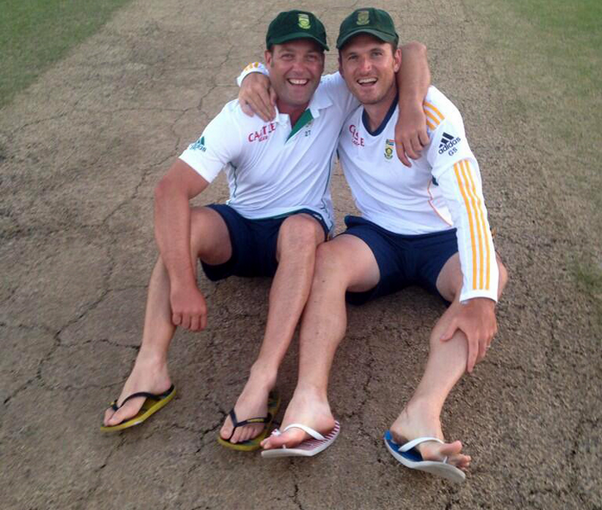Two years on, and the Proteas’ Test side is still struggling to fill the void left by Graeme Smith and Jacques Kallis. JON CARDNELLI reports.
Kallis, South Africa’s most prolific batsman and arguably the game’s greatest ever-all rounder, retired from the five-day game in late 2013. Smith, Test cricket’s most successful skipper (by virtue of wins) and one of its most combative openers, said farewell in March 2014.
Smith signed off on a disappointing note, as the Proteas lost that three-match series to Australia and surrendered their No 1 ranking. However, South Africa were back on top when Hashim Amla’s side recorded a historic series win in Sri Lanka three months later.
On the face of it, it may seem as if the Proteas have coped since Kallis and Smith retired from Test cricket. Indeed, they regained the No 1 ranking under Amla’s leadership, and have retained it in the subsequent 18 months.
And yet, it’s been evident over a period of 12 matches that the Proteas aren’t getting any closer to finding an opener or an all-rounder who can make a similar contribution. Dean Elgar has shown promise at the top of the order, but as a fighter rather than as a dominator of quality bowling. As for all-rounders, JP Duminy – a batsman who was once touted by Ian Chappell as South Africa’s future at No 4 – is the best at the Proteas’ disposal. The situation may not be dire, but it’s not exactly ideal.
The Proteas will miss a player of Smith’s calibre in the coming series against England. The former South African skipper was especially successful against England over the course of his 11-year career. Smith scored 2051 runs against England at an average of 56.97, a record that included seven 100s.
South Africa boasted some impressive batsmen during this period. Kallis (with an average of 46.72), Amla (52.57), and AB de Villiers (45.5) all made big contributions in Test series against England. And yet, Smith often set the tone at the top of the order with his brutally effective approach. Indeed, Smith outscored all of the aforementioned batsmen in series against England during this period.
Since Kallis and Smith have departed, Amla, De Villiers, and even a relative newcomer in Faf du Plessis have all been forced to take on extra responsibility. South Africa have managed to retain the No 1 Test ranking since July 2014, but the averages of these three key players have dropped as the pressure has started to tell.
Prior to that first Test against Sri Lanka in 2014, Amla averaged 51.45 and De Villiers 51.94. In the past 18 months, Amla has averaged 44.83 and De Villiers 46.4.
The decline of Du Plessis and Duminy has been more significant. Since both Smith and Kallis have been absent and more has been expected of these players, Du Plessis has averaged 32.88 and Duminy 26.55. Before, Du Plessis boasted an impressive 52.42 and Duminy a respectable 34.71.
More specifically, the Proteas have lacked an opening pair with the necessary ability and grit to set the platform. To reiterate, Elgar has done well in 19 innings with a contribution of 640 runs at 37.64. Unfortunately, he has found little support at the other end. Only two 100s and two 50s have been scored by a South African opener in the past 12 Tests. Elgar was responsible for all four milestones.
Elgar and Alviro Petersen averaged 36.7 for the first wicket in 10 innings. Following Petersen’s retirement in early 2015, Stiaan van Zyl was promoted up the order. The experiment hasn’t worked to date, with Van Zyl averaging 17.4 in six innings, and Elgar and Van Zyl managing a 32.8 average for the first wicket. Only twice have Elgar and Van Zyl recorded an opening stand in excess of 50 runs.
The recent series against India aside, Amla and De Villiers have given South Africa a reason to believe that the middle order may cope without the determination and class of Kallis. Of course, Kallis’s presence as a world-class all-rounder often meant the selectors had the luxury of selecting an extra batsman or bowler in the line-up. This lent the team balance and ultimately strengthened it. Kallis’s presence alleviated the pressure.
Nowadays, South Africa’s lineup does not boast the same balance. There is more pressure on the batsmen to perform, particularly the core of Amla, De Villiers, and Du Plessis. Similarly, there is more pressure on Dale Steyn, Morné Morkel, and Vernon Philander to take wickets.
Philander was identified as a potential successor to Kallis as the team’s designated all-rounder. Philander became the fastest South African to 100 wickets when he reached the milestone in 19 Tests (Steyn achieved the feat in 20). It was hoped that he would develop as a lower-order batsman who would contribute big runs consistently. Sadly, Philander has battled with the ball in recent times, and has thus been forced to concentrate on that side of his game. All plans to develop him as the leading all-rounder may be shelved, at least for now.
Great things were expected of Duminy after he scored 166 against Australia in only his second Test. Thirty Tests on, and Duminy has added just three centuries to his tally. Duminy has made some important and timely contributions over the past seven years, but none on the scale of that innings at the MCG, and none that should warrant further comparisons to the great middle-order batsmen of this or any other era.
These days, Duminy’s Test figures read like that of an all-rounder. He averages 32.92 with the bat and 37.55 with the ball. While he’s not ranked among the top all-rounders in Test cricket (Philander and Steyn are ranked ahead of him at No 4 and 10 respectively on the ICC ladder), Duminy will have an important role to play in the coming series. Indeed, there are not many other established all-rounders out there pushing for his place.
Photo: Graeme Smith/Twitter







